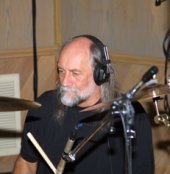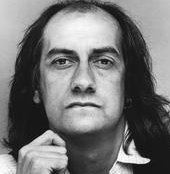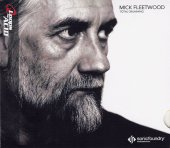When it comes to pushing the musical envelope, Mick Fleetwood literally stands head and shoulders above the crowd. Together with bassist John McVie, the lanky drummer has taken the engine room of Fleetwood Mac through various treacherous valleys to scale some momentous peaks over the course of 35 years. From the blues-infused three-guitar attack of the late 60s line-up to the milder, California-based quintet that went on to sell millions of records during the 70s, 80s and 90s, Fleetwood Mac's journey has undoubtedly been wrought with disaster, diversity and discovery.
As the captain of the ship, Fleetwood has never lost sight of what lies over the horizon. Downtime with the band presents numerous extracurricular activities -- be it his explorations into world music rhythms, his excursions with his other band, the Zoo, or a variety of eclectic collaborations. Now, Fleetwood -- in his fifth decade as a musician -- has stepped into the 21st Century with a revolutionary new offering called Total Drumming.
Total Drumming is a series of drum loops Fleetwood has created with Sonic Foundry, a highly regarded digital media software company. Utilizing the company's technology and aligning it with their flagship product ACID - , a loop-based creation tool used extensively by musicians and producers to create royalty-free music, Total Drumming boasts over 800 drum patterns developed by Fleetwood with assistance from producer Jonathan Todd and Sonic Foundry's Mike Schelbinger. In his own inimitable way, the drummer has embraced the project wholeheartedly.
"I wanted to learn more about loops and what really goes on -- how it's done, how it's controlled," Fleetwood says via telephone from Los Angeles. "I found it extremely interesting just because I'm that type of a guy."
To begin, Fleetwood, Todd and Schelbinger took a methodical approach to shifting the whole thing into gear. This required the production team, along with the drummer himself, to take a good, hard look at Fleetwood's body of work, which covers a considerable amount of ground.
"There was some homework I had to do," Fleetwood recalls. "Re-listening to albums, and re-listening to other things I'd done. In some cases, just slapping on stuff I knew that I used to play but wasn't actually my music -- like old blues stuff I found myself listening to, you know, some stuff that influenced me. And that was a lot of fun, just realizing what was enduring, what drums I was using, paying attention, and making notes."
Once they had thoroughly sifted through the material, it was time to go into the studio and begin the recording process. Aside from a drum set or two, Fleetwood's tools of the trade included wind chimes, talking drums, udu drums, cymbals, maracas, timbales, cowbells, guiros, cabasas, shakeres, rattling horse jawbones, even a gong. It took three hours just to unpack everything. But once all of the equipment was in place, Fleetwood immersed himself in the process.
"I was incredibly free to play for 16 or 17 hours for two solid days --
from early in the morning to fairly late at night," he notes. "All of
the post production work at Sonic was basically the deliberations and choices
that were made after the fact."
The end result is a comprehensive library of blues, funk and rock grooves, one-shots, and an assortment of percussive sound bytes.
"The integrity of the initial sounds is all very much intact," Fleetwood proudly exclaims. "There are no short cuts and that gives me a great comfort, which is my way of saying that this makes me feel good about handing over something I find really exciting. People can go off, perform, interact and make up their own mind as to where they go."
Needless to say, the drummer sees the marriage of music and technology as a positive step forward in the creative process. "To see technology used in a way that brings people into a creative situation has to be a good thing. There are great technologies out there that are growing and truly enable short cuts. It may apply to someone who might get frustrated and may never go into that area because they haven't sat in a room and learned to play the violin for 20 years. And the snobs of the world say, 'Well, that's what they should be doing.' I say, 'Why is that the case? Why do you have to be so one-tracked? Nothing means anything unless you've suffered?' The whole idea of what this does is a major element of bringing people into the creative process. Having said that, I'm also aware that people who are very adept at their craft of being musicians, producers, engineers -- this is just an extra piece of something fantastic."
Aside from broadening his own insights into a rich and colorful musical history, Total Drumming has also provided Fleetwood with the perfect launching pad for his current endeavor: the first full studio Fleetwood Mac album in over 10 years. For this outing, four-fifths of the group's most successful incarnation are on board. Only keyboardist Christine McVie, arguably one of the band's stronger songwriters, has opted to sit out. As always, Fleetwood and company are pressing on undeterred.
"Lindsey (Buckingham) has done the lion's share of producing and engineering on the project, which is a first," Fleetwood says. "We're working out of a house in Los Angeles instead of a studio. That's worked really well. It's made it a lot more human with just us and no one else there. There's no sense of clocking in, clocking out. It's just a situation that lives and breathes."
Fleetwood says the sessions have been so fruitful that the album will likely be a two-disc set. This, of course, will probably delay its release until 2003.
"A Christmas release has turned into a New Year release because we obviously need more time to finish up if it's a double package. We'll at least allow for that possibility," he says.
With Christine McVie out of the fold, Fleetwood cites a change in the climate
and dynamics of the record and the band. He attributes this to the chemistry between Buckingham and Stevie Nicks, who were
working and living together prior to being discovered by the drummer.
attributes this to the chemistry between Buckingham and Stevie Nicks, who were
working and living together prior to being discovered by the drummer.
"Stevie and Lindsey, as a creative partnership, are majorly back in the saddle," he says. "These are the two people whom I heard and saw and asked to join Fleetwood Mac. And now they are who they are without Christine. It's Buckingham Nicks. They're finding their harmonies that we added to the band all those years ago. They're getting back to where they were when they joined Fleetwood Mac, in terms of the energy. And that's pretty wild."
Once the band finishes the still yet to be titled album, they'll hit the road for an all encompassing tour. "We'll probably start around mid-April," Fleetwood says. "The wheel is turning at an ever increasing rotation towards that. We'll know when we walk on stage and ultimately do what we're fairly good at doing."
At 55, one would think that Mick Fleetwood would be getting ready to wind down his long and illustrious career. However, his professional and personal life seems to be on a roll. "At this point, I am truly looking at my life and my career and seeing how unbelievably lucky I have been to do something that I love to do," he says. "I've been truly blessed with being totally free within the ranks of Fleetwood Mac. And with my two beautiful young daughters, I'm getting the chance to be a family man again. All is good."
Buy this product here at www.mickfleetwood.com
Posted originally here - http://classicrock.about.com/library/weekly/aa080902a.htm
Credit to Pip Fidler for bringing this to my attention

